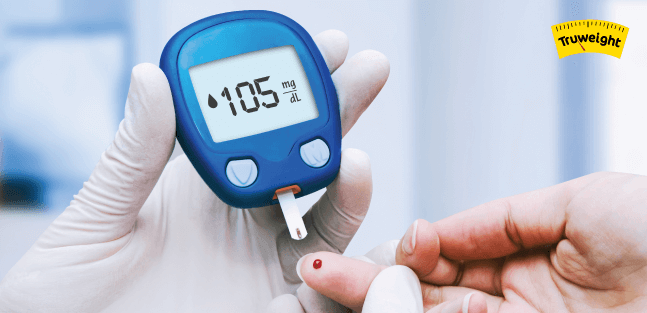Hypoglycemia is a very common medical condition experienced by individuals at least once in their lifetime.
Though it is most frequently encountered in diabetic patients for reasons outlined later in the article, non-diabetics can also have hypoglycemia due to many causes.
Table of Contents
- The definition of Hypoglycemia
- Normal blood glucose levels
- Hypoglycemia levels
- Hypoglycemia causes
- Hypoglycemia signs and symptoms
- Top 5 signs that you have hypoglycemia
- Treatment of Hypoglycemia
It is worthwhile to know the symptoms of this conditions and effective ways to prevent it in order to identify it and take appropriate and timely medical consultation.
The definition of Hypoglycemia
Hypoglycemia is a condition of the body in which the amount of glucose in the blood decreases below normal levels.
It is characterized by numerous symptoms that alert the patient about the low glucose level in the body. Medical practitioners identify hypoglycemia by examining tell-tale signs of the condition.
Normal blood glucose levels
The body utilizes glucose as its main energy source. Hence, it is imperative that there is a steady supply of glucose to the body at all times for proper functioning of all the systems.
The normal levels of glucose in the blood are 70-99 mg/dL.
Hypoglycemia levels
The American Diabetes Association and the European Association for the study of Diabetes have proposed 3 levels of hypoglycemia:
#Level 1 – A glucose level of 70mg/dL or less. When the blood glucose level falls below 70mg/dL, symptoms start appearing in the patient.
#Level 2 – A blood glucose level of < 54mg/dL indicates a more serious hypoglycemic level which can be identified clinically.
#Level 3 – Severe cognitive impairment signifying severe hypoglycemia when the blood glucose levels fall to < 50mg/dL. External medical assistance is required for recovery. The patient may suffer irreparable damages or may become critical if left unattended at this stage.
Hypoglycemia causes
1.Causes in Diabetic patients
Diabetic individuals lack insulin which is essential to metabolize glucose. Hence, these patients are given synthetic insulin in the form of injections. Alternatively, medicines that decrease the absorption of glucose or drugs that stimulate the secretion and utilization of insulin in the body are also prescribed.
The net effect of all these anti-diabetic drugs is decreasing in blood glucose level. Hence, an overdosage of anti-diabetic drugs is the most common cause of hypoglycemia in diabetics.
Other reasons include not taking enough meals following administration of an anti-diabetic or performing too much exercise than normally done.
2. In non-diabetic individuals
Low blood glucose or hypoglycemia can affect persons who have no history of diabetes mellitus also. The various causes include:
Drugs: Accidental intake of oral anti-diabetic drugs can induce low blood glucose levels immediately in people not suffering from diabetes mellitus.
Alcohol intake: Excessive alcohol intake affects the metabolism of glucose by liver causing low glucose levels in the bloodstream
Hormone deficiencies: Deficiency of hormones secreted by the pituitary gland or the adrenal gland can affect the glucose levels in the blood
Excessive insulin secretion: Certain tumors called insulinomas to involve the excessive release of insulin into the body causing dangerously low levels of glucose and severe hypoglycemia
Other causes: Diseases such as hepatitis, glomerulonephritis can impair glucose metabolism. Long-term starvation can also cause low glucose levels.
Hypoglycemia signs and symptoms
There are a myriad of signs and symptoms induced by hypoglycemia and the following is an exhaustive list of the same
- Tiredness
- Shakiness
- Fatigue
- Sweating
- Irritability
- Moodiness
- Anxiety
- A headache
- Nervousness
- Hunger
- Pale skin
- A feeling of tingling sensation around the mouth
- Irregular heart rhythm
 Signs and symptoms can occur even during the night time. These include:
Signs and symptoms can occur even during the night time. These include:
- Excessive sweating
- Damp bed sheets due to perspiration
- Irritability and tiredness on waking up
- Confusion on waking up
- Nightmares
Severe hypoglycemia is indicated by the following symptoms and signs:
- Clumsiness
- Jerky movements
- Drowsiness
- Confusion
- Blurry vision
- Double vision
- Muscle weakness
- Seizures or convulsions
When a severely hypoglycemic patient is not revived, it may result in unconsciousness and death.
Top 5 signs that you have hypoglycemia
To prevent the body from suffering the bad effects of hypoglycemia, it is essential to identify the early signs and symptoms of the condition. The most common symptoms that can alert you of impending hypoglycemia are:
1. Lightheadedness or dizziness
When you skip your breakfast, you would have normally noticed that while you are upright, you feel like you are about to swoon and faint. This can also happen in diabetics who have taken the oral anti-diabetic drugs but have forgotten to take meals.
In such cases, don’t attempt to stand or walk but rather sit down and try to chew on something that might supply glucose immediately like a sweet or chocolate. Diabetics should try to take non-sweetened snacks instead.
2. Sweating
Excessive sweating or perspiration regardless of what temperature is the external environment can usually be the beginning sign of an oncoming hypoglycemic episode. Be prepared to eat something if you spot this sign.
3. Inability to concentrate
Remember how our elders asked us not to skip breakfast while going to school or college? The same holds true for office-goers too. Low blood glucose levels can interfere with the proper functioning of the central nervous system.
One of the most common signs of hypoglycemia is an inability to concentrate on tasks and wandering of thoughts causing confusion.
4. Shakiness and tremors
The central nervous system goes haywire without sufficient glucose and movements controlled by it become jerky with the appearance of tremors in the limbs.
5. Anxiety
Whenever the body senses a dip in the glucose levels, the adrenal glands are triggered to release adrenaline which causes feelings of anxiety.
Hence, undue anxiety which cannot be explained due to any stress, is another common early symptom of hypoglycemia.
Treatment of Hypoglycemia
Fortunately, hypoglycemia is usually mild and temporary and low blood sugar treatment can immediately restore normal body functions.
Short-term treatment
Includes immediate reversal of hypoglycemia by supplying at least 15 grams of fast-acting glucose to the body. This can be in the form of instant glucose powders, hard candies, glucose tablets, fruit juice, milk, soft drinks, etc
Long-term precautions
to prevent hypoglycemia include taking regular meals at short intervals, limiting refined carbohydrates, caffeine and alcohol and including high fiber and protein content in everyday meals.
Hypoglycemia is a relatively common medical condition that is easier to tackle when one learns to identify the symptoms and signs.
Diabetics are more prone to this condition and need to follow adequate precautionary measures to avoid this unwanted side-effect of anti-diabetic drugs.
The first consultation is on us. Book your FREE CONSULTATION with a Possible Nutritionist!

 Signs and symptoms can occur even during the night time. These include:
Signs and symptoms can occur even during the night time. These include: